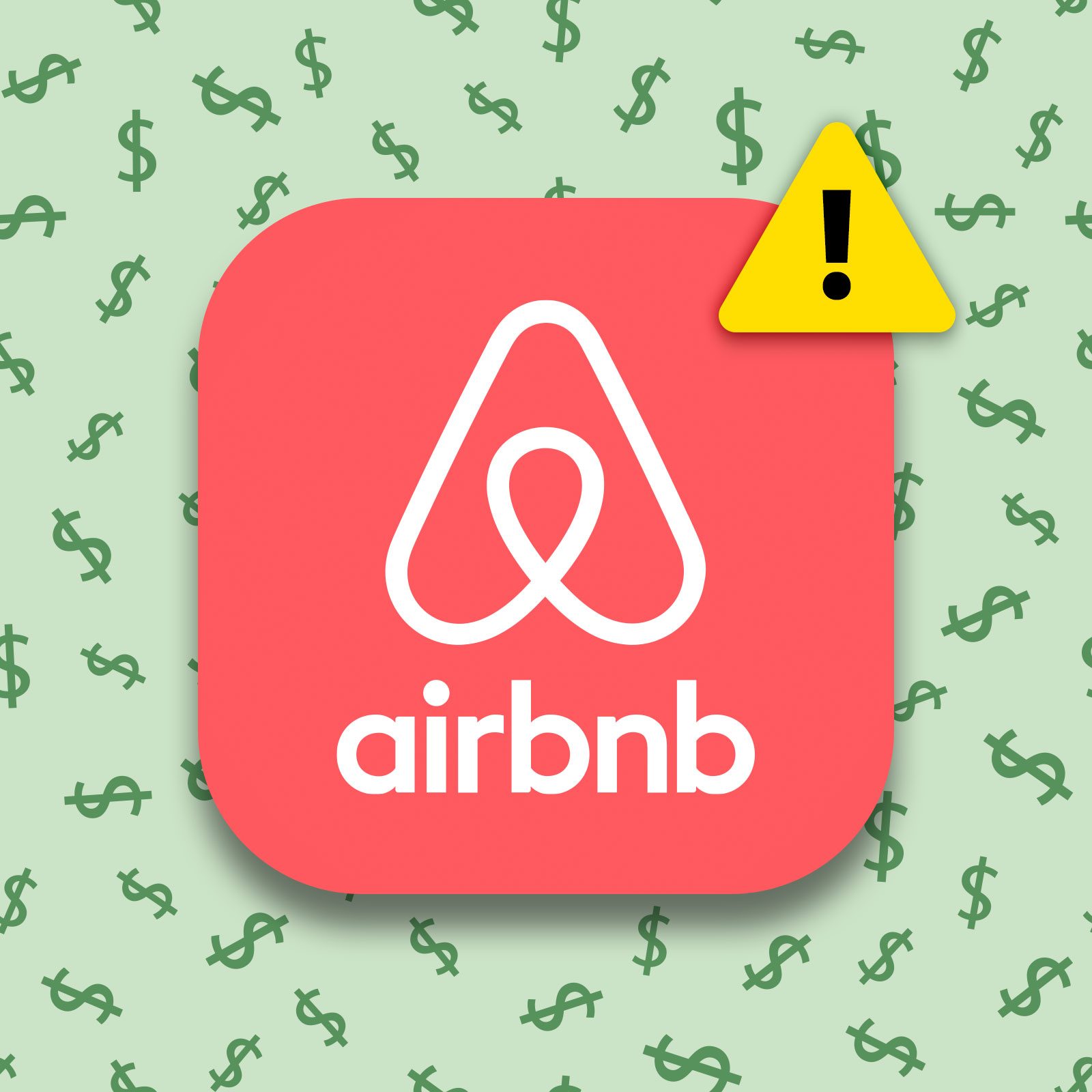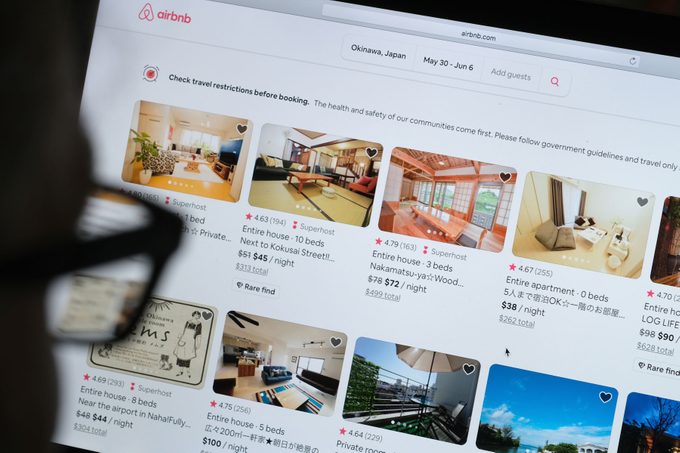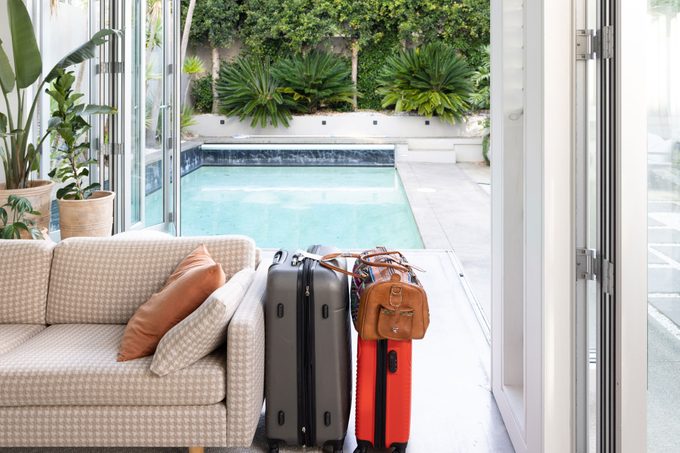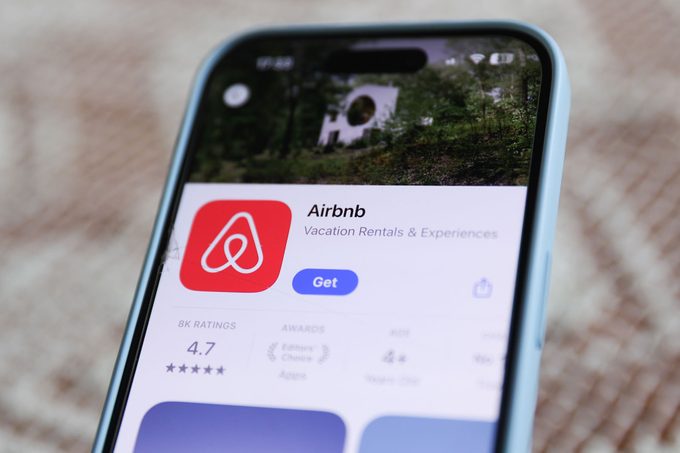Short-term rentals are a popular way to book lodging for a vacation. But you need to be cautious when choosing one so you don't fall victim to an Airbnb scam.

The 9 Most Common Airbnb Scams and How to Avoid Them

When you’re deciding between a hotel and an Airbnb, there are a lot of reasons to choose the latter. These popular home and apartment rentals give you more space and a homier feel while you’re traveling, plus they can save you money on restaurants since you’ll likely have your own kitchen. But one unwanted side effect of this model’s success is an increase in Airbnb scams.
Airbnb is a legitimate company, and most of its hosts are honest and welcoming. But the rise of online scams in general makes Airbnb a target for fraudsters. “The overwhelming majority of users will be happy with their results, but whenever there’s a lot of money trading hands globally—especially at long distances, when you can’t personally inspect the property and vet every promise—it’s going to attract the attention of scammers,” says Monica Eaton, founder and owner of the fraud-solutions company Chargebacks911.
And money is absolutely changing hands on Airbnb, by the fistful. Users booked more than 448 million “nights and experiences” in 2023. So it pays (literally) to be diligent when booking a property on Airbnb. While it’s no easy task to figure out how to identify a scammer, we talked to experts who shared their top tips. Read on to learn about the top scams to look out for on Airbnb and how to avoid them.
Get Reader’s Digest’s Read Up newsletter for more scam-avoidance tips, tech, travel, humor and fun facts all week long.
Can you get ripped off on Airbnb?
Absolutely. You can get scammed on Airbnb just like almost anywhere else money changes hands. In 2023, Airbnb generated $9.92 billion in revenue and $4.9 billion in net income. With that kind of cash floating around, there are bound to be scammers, though the number of scams that are specific to Airbnb isn’t clear. However, Airbnb scams were definitely on the rise in 2023, according to an Associated Press report. It’s safe to assume the same will be true of 2024 when the numbers are crunched.
The good news is that both guests and hosts are protected through the company’s platform, so knowing how to recognize common Airbnb scams and their signs will help keep you safe. “The cardinal rule of the internet ought to be, ‘If it’s too good to be true and costs you money, it’s probably a scam,'” Eaton says.
Below are nine Airbnb scams to keep an eye out for.
Common Airbnb scams
Multiple listings scam
What it is: The host lists the same property at different price points to double-book it. Then, they rent the property to the highest bidder.
How to avoid it: When looking for an Airbnb, you can easily scan through several dozen listings to find the right one. Keep an eye out for properties that look the same or similar. If you see a property listed at multiple price points, steer clear.
Fake listing scam

What it is: Scammers can make a fake listing with an address that doesn’t exist. After you’ve laid out the cash and shown up with your luggage, you realize there’s nowhere to stay. Airbnb does its best to remove these listings—it deleted 59,000 of them last year and prevented another 157,000 of them from getting on the platform at all—but persistent scammers will circumvent Airbnb by continuously creating new accounts.
How to avoid it: Google is your friend when sussing out this common Airbnb scam. It’s better to find out before arriving in Phoenix that the address for your four-bedroom rental with a pool actually belongs to a pizzeria. “An internet search of the address can help determine if the property exists,” says Lisa Schiller, senior director of investigations and media relations for the Better Business Bureau of Wisconsin.
Perfect images scam
What it is: Some people search for the fanciest places to stay, while others search for the cheapest. Regardless of what you’re looking for, be realistic. Just like in catfishing scams, don’t be lured in by perfect images that may have been photoshopped or highly filtered. “The host may put up fake or doctored images that make the property seem significantly nicer than it really is,” says Kevin Roundy, a security and AI researcher at Andromeda Security. “Some of these photos might be of the actual property but are highly edited, and other photos might be of a completely different property.”
How to avoid it: Take a minute to do a reverse image search to make sure photos from listings are not stock photos or stolen from somewhere else online, Roundy suggests. You can do this kind of search from either your smartphone or a computer.
“Too good to be true” scam

What it is: Exactly what it sounds like. You think you found one of the coolest and cheapest Airbnbs, but your expectations will be crushed when you walk through the front door. “We all want to get a great deal, but a property that is ridiculously low-priced is often an indicator that something isn’t right,” Eaton says. “If you find a Honolulu beachside home for $80 a day, you should probably dig a lot deeper before reaching for your credit card.”
How to avoid it: Do a little bit of homework. While it may be tempting to fall for the “great deal,” there’s always the possibility that it isn’t as great as you think it will be. Eaton says that Airbnb lists the average prices for its properties by location, city and date, so if you find a property that dramatically deviates from the norm, raise an eyebrow.
If you’re still tempted to take a chance on it, Roundy suggests finding out if the host’s identity has been verified by Airbnb, which you can find on the host’s profile. You also can ask for a video walkthrough. And of course, read reviews to see what other renters have to say—just be aware that scammers can fake those too.
Fake reviews scam
What it is: In this scam, hosts create fake Airbnb accounts and then write and post glowing reviews for their own properties. They may even enlist friends and family to write positive reviews for them too. This boosts their average rating and tricks renters into believing the place is nicer than it is.
How to avoid it: Look for properties with several hundred reviews—it’s difficult for scammers to post that many fake ones. Also, don’t discount any two- and three-star reviews; these are likelier to be legitimate.
Bait-and-switch scam
What it is: In this scam, a property is advertised as a travel bargain, but the price inflates when it comes time to pull your wallet out. With Airbnb, this typically happens right before you’re set to arrive. “The host informs the guests that the rental they booked is no longer available, and they’re offered an alternative, lower-quality rental instead,” explains consumer privacy advocate Paul Bischoff. One common reason they cite for the switch is that the property you booked developed a horrible plumbing issue. “In reality, the original rental might have never existed,” he says.
How to avoid it: It’s tricky to spot a liar, especially when we want to believe something is real. But reading reviews, reverse-searching images and checking the address—the tips we’ve offered for other scams—give you a better chance of getting the Airbnb you think you’re getting.
Illegal listing scam
What it is: Many U.S. cities, such as New York and Las Vegas, have banned or significantly restricted short-term rentals (typically considered 30 days or fewer). But that doesn’t stop scammers from listing their homes in these cities on Airbnb. So you may arrive at the address, only to be told by the building’s security that you can’t stay there. At that point, your only option is usually to pony up for a hotel stay at last-minute prices.
How to avoid it: Before booking your stay, do a quick online search of your destination’s laws around short-term rentals. If you do get scammed, you might be able to get back any money you paid the “host” from Airbnb—but don’t count on being reimbursed for your hotel stay.
Outside payment scam
What it is: This is when a host asks a guest to pay them directly through PayPal, bank transfers or even in cryptocurrency. You should absolutely never do this. It’s possible that these hosts are just trying to avoid Airbnb’s fees, but it also can be a scheme to prevent guests from being able to report any fraud to Airbnb directly. “Their objective is to make it more difficult for you to find them and recover your money because cash transactions are tough to recoup,” says Eaton. “Not following Airbnb’s payment rules is playing right into the scammer’s hands.”
How to avoid it: Don’t ever interact with the host outside of the Airbnb platform, particularly when it comes to paying for it, advises John Blesso, an Airbnb host in New York’s Hudson Valley. “The site was designed to protect both hosts and guests,” he says, “and it’s a red flag if someone wants to communicate or make a payment off the site.”
In fact, Airbnb explicitly forbids this, except in specific circumstances: “Certain off-site payments are permitted only when permission has been granted in advance by Airbnb and guests are made aware prior to booking,” the company says. This may include payment for extraneous costs such as “all-inclusive” fees at resorts or timeshares, security deposits, pet fees, valet parking, gym fees and local or occupancy taxes. But if you’re not informed of this before you pay, consider it a scam.
False charges scam
What it is: One of the risks of operating an Airbnb is that guests sometimes break or damage items in the home. When that happens, they’re entitled to reimbursement. But if your host is a scammer, they may try to charge you for damages after your stay, even though none occurred.
How to avoid it: Just like when you rent a car, it’s a good idea to take photos of the property when you first arrive—particularly if you notice anything that’s not in picture-perfect condition—and when you leave. If you do notice damage at check-in, be sure to send your photos to your host right away via the Airbnb platform. Then, if you get a reimbursement request, respond as quickly as possible, submitting your evidence to Airbnb. If Airbnb decides you’re not responsible, you won’t have to pay.
Signs of an Airbnb scam

In addition to the red flags we walked you through above, you should keep these signs of possible Airbnb scams in mind.
- The listing seems thin. Eaton warns that if a host’s profile is incomplete, it could be a warning sign. If you’re their first guest, that could be another. Every honest property owner had to begin with his or her first guest at some point, but when there really isn’t that much to go on, it’s hard to know what you’ll be getting.
- The host sends a message with a suspicious link. Cybersecurity experts unanimously agree that you should never click on any unknown link in any messages (not just on Airbnb). “One of the major scams involves sending out links to a bogus site that mirrors the look and feel of the Airbnb site but is actually counterfeit,” Eaton says. This could be a type of phishing in which the scammer is attempting to steal your personal or financial information.
- The host is slow to respond to messages. When you’re booking a place to stay, hosts should be responsive to your communications with them. One of the things that makes an Airbnb host a Superhost is their speed at getting back to you. If you feel like your host is ghosting you after you’ve paid your deposit, they probably are. “But you can generally trust Superhosts,” Eaton says. This is a badge hosts receive for consistently high user ratings (4.8 and above), 10 or more bookings every year and a speedy response rate. “About 99% of the time, they don’t cancel bookings,” she says.
What to do if you’ve been scammed
If you paid with a gift card or wire transfer, here’s why you shouldn’t ever do that again: “These payment methods are the same as sending cash—once you send it, you have no way to get it back,” Schiller says.
But if you paid with a credit card, be grateful. Both Airbnb and the bank that issued your credit card can likely provide at least some relief.
Getting an Airbnb refund
Airbnb has a resolution center that allows refund requests both during and after your trip.
After arriving at a rental that’s not quite what you expected, you might decide to stay anyway if it’s a peak travel time and finding alternative lodging would be next to impossible. Airbnb asks that you report the problem within 72 hours of determining a travel issue. The host then has an hour to respond, Eatons says. “If you don’t hear back from the host within an hour—or if they refuse to help—you can then ask Airbnb to intervene,” she adds. The company outlines the rules and regulations for rebookings and refunds on its website.
“Make sure you have all your evidence ready, including photos and/or video,” Eaton suggests. “Remember, it’s always better to take too many photos than not enough. Your smartphone is your friend!”
Working with your credit card company
It’s one thing to find out that an amenity is less than promised or unavailable; it’s a much more serious issue if your financial data has been compromised as a result of an Airbnb scam. “Your bank needs to be alerted ASAP to protect you from future fraud and help you recover whatever was stolen,” Eaton says, reminding people that credit cards offer significantly more protection than debit cards. “With debit cards, you’re much more vulnerable to fraud loss, and if you don’t act quickly, you could potentially lose every last penny in your account,” Eaton says. “Credit cards have special federal protections that debit cards lack.”
About the experts
|
Why trust us
Reader’s Digest has published hundreds of articles on personal technology, arming readers with the knowledge to protect themselves against cybersecurity threats and internet scams as well as revealing the best tips, tricks and shortcuts for computers, cellphones, apps, texting, social media and more. For this piece on Airbnb scams, Jaime Stathis tapped her experience as a longtime journalist who covers technology, scams and cybercrime for Reader’s Digest to ensure that all information is accurate and offers the best possible advice to readers. We rely on credentialed experts with personal experience and know-how as well as primary sources including tech companies, professional organizations and academic institutions. We verify all facts and data and revisit them over time to ensure they remain accurate and up to date. Read more about our team, our contributors and our editorial policies.
Sources:
- Yahoo Finance: “Airbnb Full Year 2023 Earnings”
- Associated Press: “Airbnb says it’s cracking down on fake listings and has removed 59,000 of them this year”
- Monica Eaton, founder and owner of Chargebacks911; interviewed, April 2023
- Kevin Roundy, security and AI researcher at Andromeda Security; interviewed, April 2023
- Paul Bischoff, privacy expert at Comparitech; interviewed, April 2023
- Lisa Schiller, senior director of investigations and media relations for the Better Business Bureau of Wisconsin; interviewed, April 2023
- John Blesso, Airbnb host in New York’s Hudson Valley; interviewed, April 2023
























